#bousingots
Explore tagged Tumblr posts
Text

Ok, fine @sanguinarysanguinity. I wasn't going to share "Après le péché" mostly because it's too weird, not because it's too spicy (like Leçon de paysage or La femme du peintre).
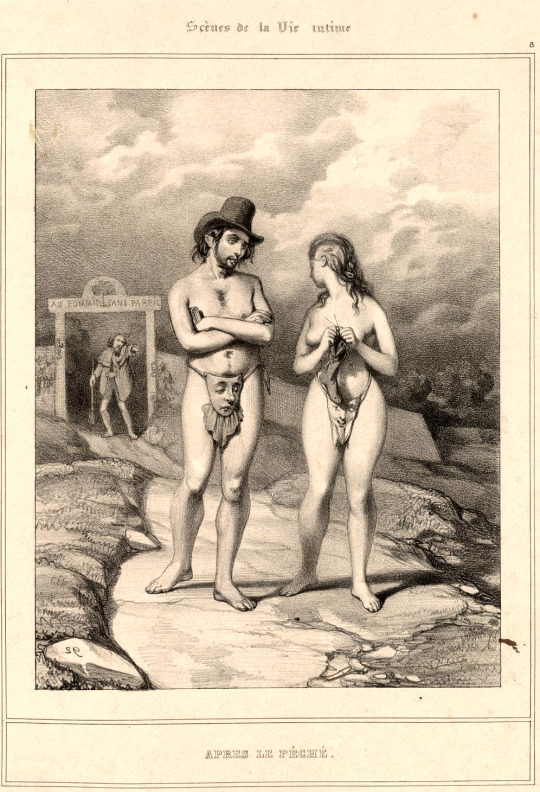
I thought it was an angel with a flaming sword chasing Adam and Eve from paradise, not an old guy with a broom—but either way works.
There's the loin-masks seeming to express their true selves, but also why is Adam a bousingot, complete with the silly hat?? It was up to Eve to investigate the Tree of Knowledge since Adam was too busy smoking and reading Le Charivari.
#paul gavarni#scènes de la vie intime#après le péché#1830s#romantic era#bousingot#you think i'm exaggerating he literally has a folded newspaper under his arm
32 notes
·
View notes
Text
if there was anything to do, and any "bousingot" to track out, it was in that quarter. From time to time, parties re-sole their old insults. In 1832, the word bousingot formed the interim between the word jacobin, which had become obsolete, and the word demagogue which has since rendered such excellent service.
LM 5.3.2
#the difference between reading this the first time and now is vast#but def one of the Differences#is that now I am Emotional about this word#and so many other LM References#thanks Vugs#Bousingot
14 notes
·
View notes
Text
If the sewers are one of the circles of hell, they have their demons. And these demons are the police dispatched to hunt down the surviving insurrectionists. Fortunately for Jean Valjean, their efforts lack thoroughness. Even the lantern failed to expose him in the darkness, as they hurried toward Saint-Merry with its larger barricade.
Adding to the portrayal from the previous chapter, Hugo reminds us that Jean Valjean's remarkable resourcefulness wasn't an easy feat, considering he teetered on the brink of exhaustion due to 'lack of sleep and food.' The sudden emergence of the police behind him must have been extremely stressful, likely triggering flashbacks of a previous instance when the police chased him with Cosette before he reached the convent.
I love how Hugo chose to digress and explain the meaning of the word 'bousingot' as it was in 1832. It’s just so like him!
37 notes
·
View notes
Text
This might be short, but!
The tension around the lantern reminds me of the scene where Jean Valjean flees the Gorbeau house (the first time): I don’t know if it’s just a similar image of Valjean hiding in the shadows, but it feels similarly suspenseful. There is also, of course, dog imagery, as he hides from the “bull-dogs” and the “watch dogs” that hunt for those who have crossed societal/political lines in the sewers.
“From time to time, parties re-sole their old insults. In 1832, the word bousingot formed the interim between the word jacobin, which had become obsolete, and the word demagogue which has since rendered such excellent service.”
This is just a very funny way of phrasing a change in terminology.
It’s absolutely terrifying that the bullet came so close to Valjean! As long-winded as Hugo can be, he really does get tense moments, too; this entire section is so scary, which makes it quite fun to read.
It’s also fascinating to know that Valjean was saved not by his escape skills here, but by the flaws of the sewer itself, with the system he’s stumbled into being too much of a hassle to explore. The possibility of armed people is a threat as well, to be fair, but the chaos of the sewer - much like other harsh environments, like the forest or the convent - proves to be beneficial to Valjean in that it destabilizes hierarchies, giving him a chance to prevail in a way he wouldn’t in “organized society.” The sewer is still dangerous; of that, there’s no doubt. Still, it’s the scariest and darkest place Valjean has chosen in a long line of shady places that offer cover.
17 notes
·
View notes
Text
« Un portrait de Pétrus, par Napoléon Thomas, fut exposé au Salon de 1833. — Gilet rouge, habit aux larges revers pointus, gants sang-royaliste, chapeau pointu, barbe et cheveux flottants, tenue de Bousingot et de Jeune-France; le tout dans un cadre tricolore. »
Alphonse Parran, Petrus Borel
A portrait of Pétrus by Napoléon Thomas was exhibited at the 1833 Salon. — red waistcoat, a frock coat with a large pointed collar, gloves of a royalist-blood shade of red, a pointed hat, flowing hair and beard, the attire of a Bousingot and a Jeune-France; all that within a tricolor frame.
#rouge sang royaliste should be used in color catalogues#idk parran but that was a great choice#of words#fashion icon petrus borel#if anyone has seen this painting please let me know!!#french romantics
7 notes
·
View notes
Text
So, Jean Laraviniere died and I'm very upset about it.
In other news I do like how George Sand depicted the 1832 June Rebellion.
#i know this post is of interest to only me and also honestly#this was expected from a bousingot and a revolutionary#what did i expect would happen if you put jean laraviniere in 1832 rebellion#but i am still upset#he was the best thing about this novel#the narrator is so annoying#and really don't get me started on how many levels of hate i have for horace#my poor jean laraviniere i am going to miss him#george sand#horace
8 notes
·
View notes
Text
Brickclub 5.3.2 “Explanation”
I don’t know what to make of this chapter.
We learn that the police in the sewer are part of a city-wide patrol looking for escaped bousingots--Hugo pauses to define the word, here, one that’s come up before in this book, but not often--with soldiers on the surface and police in the sewers.
(If I’d had to guess where in Les Miserables Hugo defined the word bousingot for the reader, I absolutely wouldn’t have put it here, after the rebellion is done, after all our favorite countercultural rebels are dead.... but maybe that’s because I’m too used to Borel reclaiming it, and normal people think of it as a pejorative term. Here, it’s the police’s term for the insurgents.)
Valjean isn’t seeing or thinking clearly--the lantern is a distant red light, and he makes out phantoms around it, and he knows to hold still and hide. But he hasn’t put together what or who it is, which is more indication than we usually get about how far out of it he is.
What he sees is a nightmare version of what he saw the night he and Cosette fled the Gorbeau house:
Jean Valjean saw these goblins form a kind of circle. These mastiffs' heads bunched together and whispered.
Once again, he’s on the run, and he can see the police gathered in an open square discussing how to catch him. Once again, the police make the mistake of staying in the light, which makes them easy to see and Valjean difficult to see. This time, in this bad light and bad state of mind, they’re not people but demonic guard dogs. And he’s not carrying Cosette, the living child he loves, he’s carrying Marius, her nearly-dead boyfriend whom he hates. And he’s not on the surface, heading towards burial, he’s already buried.
Javert failed that night because he was too thorough: he checked all the corners, giving Valjean time to climb the wall. Tonight, the police fail because they’re not thorough enough.
But I’m not sure how to put it all together. The police get a whole chapter here, but not much happens in it. We see again the ambiguous status of the sewer--the police can come here, but they don’t own this place the way they own the streets; they’re visitors here, and they’re awkward at it and out of their depth.
There’s something here about the inverted convent chase, but I’m not putting together what or why.
3 notes
·
View notes
Text
BrickClub 5.3.2
As with the escape from Javert into the convent, Valjean discovers that he is being followed before Hugo stops the main plot to explain us how he came to be followed by the police??
Also, as always, what happens or does not happen to Valjean hangs upon a tiny chance thing, because Hugo is who he is. Also Valjean is doing so badly??? Like, obviously he is, who wouldn’t, but CHRIST, his brain is once more a Situation and not even a little bit fun. This is not a fun daring escape, huh.
Also the word “bousingot” fell and even though I know nothing, I am aware enough of what there would be to know that my heart did a !!!!!!! of fondness when I read the word. Amazing.
6 notes
·
View notes
Text
Brick Club 5.3.1, 5.3.2

Valjean is country bred through and through so maybe he hasn’t heard the hideous legends of the sewers. Not that he’s being given much choice, stuck between a barricade and a cloaca. “To descend into the sewer is to enter the grave.” And if you emerge at the end are you born again? Or in Valjean’s case again again? Marius, at least in some sense, “dies” and then rises again, but I don’t know that this symbolic rebirth or rebaptism really reflects in his character but I’ll hold judgement for now.
Jean Valjean chooses to ascend. Doesn’t he know that he has to symbolically descend to his lowest point before he can ascend again? Again again? Get genre savvy, Valjean. “Jean Valjean was obliged to find and almost to invent his route without seeing it…Like the prophet, he was in the belly of the monster.” Maybe there’s something here about placing yourself in the hands of fate or God and trusting that your tribulations will be repaid in kind. Valjean is also undergoing the trial of the sewers in Marius’s stead, a Jesus metaphor if I ever saw one. Although that implies Marius needs delivering from some sin or wrongdoing, not just from danger itself. I’m reaching but possibly Marius’s “sin” is seeking to die on the barricade, without the excuse of being a martyr. I really could be reading too much into this, but it’s hard to buy that the extended depiction of this journey has no deeper implication than ‘Valjean saves Marius despite his baser desires.’

The first instance of a quickly recurring theme shows up here: “It was light and [Valjean] was shadow.” Valjean has spent most of his time as Fauchelevent bathed in symbolic serene inner light and he loses that in the sewer. Later on he even becomes something of a shadow in Cosette and Marius’s new life and he sees himself as shading their happiness together. Is this a natural dimming (of life energy or some-such) or is there a moral aspect to this? Or is he literally passing the torch as the book winds down?
I found a neat little article on the word bousingot which doesn’t have any bearing on the current events but is a cool epithet of the time that hasn’t come up until now. This has the same energy as calling political protesters today ‘rabble-rousers’ in an infantilizing tone while seething that you have to use people’s pronouns.
#brickclub#les mis#les miserables#5.3.1#5.3.2#marius is really putting the work in for these illustrations#he gets to swoon in like everyone its kind of glorious
4 notes
·
View notes
Photo

Le Bousingot (à Geneva, Switzerland) https://www.instagram.com/p/BwO2zwmnfUyjUEpLvSE598q3nV0lt2tS5PBgEA0/?utm_source=ig_tumblr_share&igshid=1e9ukr1wg45po
0 notes
Text
Eighteen-Thirties Thursday: Newspapers and Their Readers
I am obsessed with this print by Victor Adam, Les journaux et leurs lecteurs, depicting the stereotype reader of various French newspapers, in the Rijksmuseum collection. Although it's dated c. 1830-1854, the clothing of the caricatures is very 1830s.
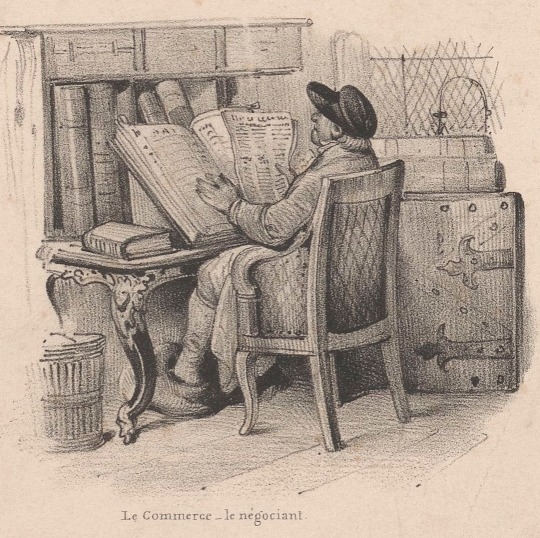
A merchant reads Le Commerce. (Are his feet tucked into some kind of warmer?)
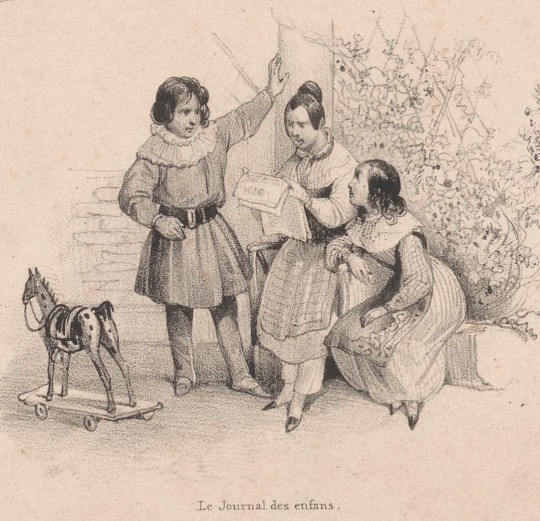
Children read Le Journal des enfans.
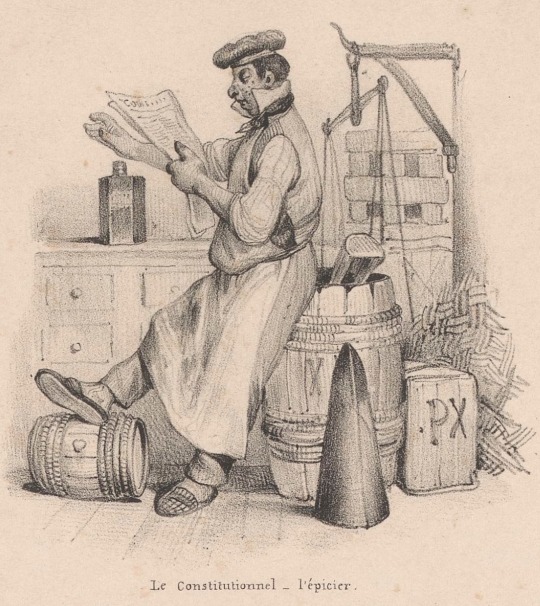
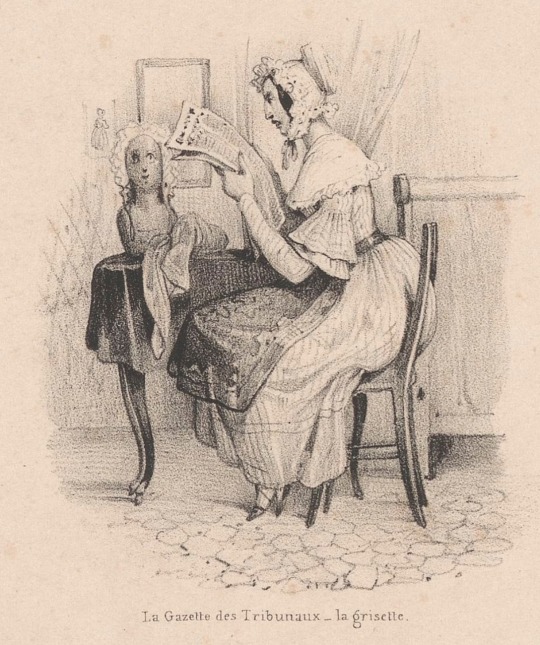
A rare look at working class people in fairly realistic portraiture: a grocer reads Le Constitutionnel and a grisette (younger working woman, often employed as a seamstress) reads La Gazette des Tribuneax.
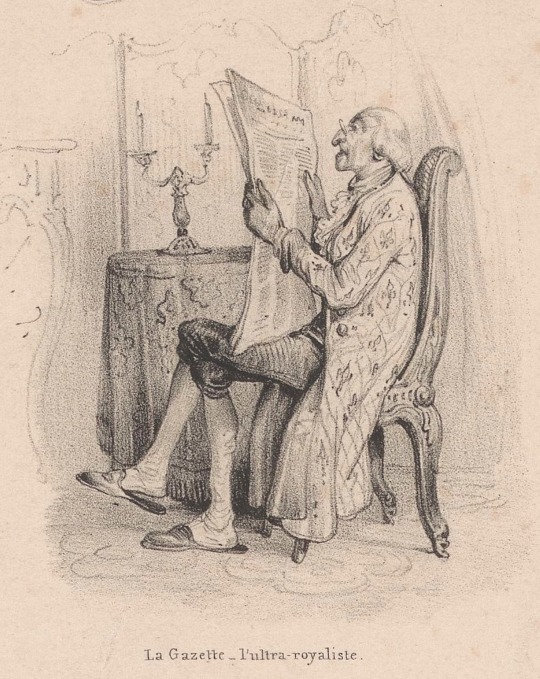
A man in knee breeches, in this economy? Of course he's l'ultra-royaliste reading La Gazette.
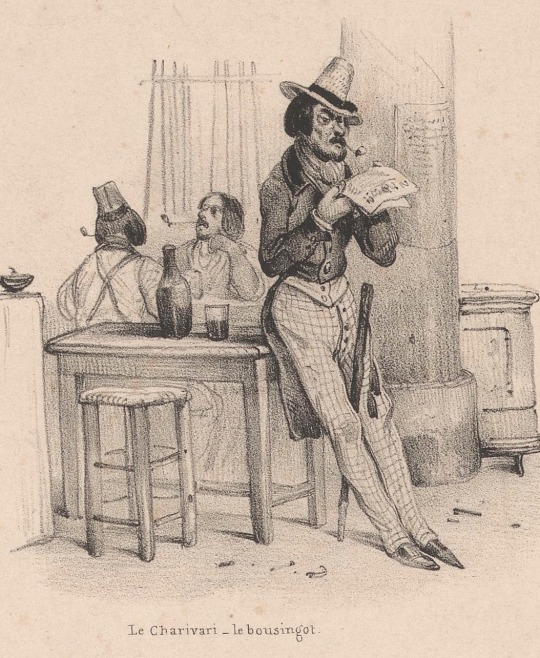
Swanky, obnoxious outfit, long hair, reading Le Charivari illustrated magazine—it's a bousingot Romantic! The hat is characteristic.
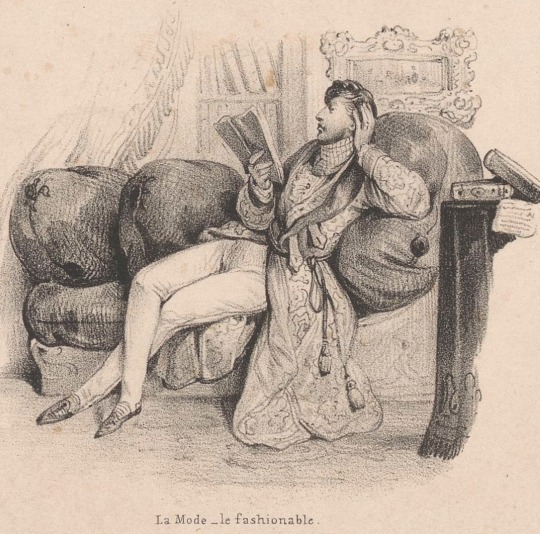
The fashionable man reads La Mode (and looks great doing it).
#Eighteen-Thirties Thursday#1830s#fashion history#men's fashion#romantic era#dress history#newspapers#french history#fashion#historical men's fashion#bousingots#bouzingos#romantacism
142 notes
·
View notes
Text

[ID: the "X Mentioned!" meme , saying "Bousingot Mentioned!" /ID]
The result of this council held by the watch dogs was, that they had been mistaken, that there had been no noise, that it was useless to get entangled in the belt sewer, that it would only be a waste of time, but that they ought to hasten towards Saint-Merry; that if there was anything to do, and any “bousingot” to track out, it was in that quarter. From time to time, parties re-sole their old insults. In 1832, the word bousingot formed the interim between the word jacobin, which had become obsolete, and the word demagogue which has since rendered such excellent service.
--LM 5.3.2
11 notes
·
View notes
Text
Slightly out-of-left field purchase of the day....I’ve bought a 2nd edition 1833 printing of Les Bousingots by “ F. L. Groult de Touriaville...a little anti-Bousingot tract :) It’s only 12 pages long, so when it arrives I might see if I can scant it all.
10 notes
·
View notes
Text
I keep feeling bad for Mme Jondrette. She does almost blow their cover, saved only by her husband's quick thinking, but it's because she thinks he's actually showing her sympathy and kindness. She's awful, but she also seems starved for affection? It's been mentioned before that the actual love in their marriage is gone, and while she loves her daughters, her relationship with them seems to be more of attempted protection foiled by her husband than of shared affection. Part of the issue with M Jondrette's scheme is poor communication and different levels of acting skills (because if he, who's supposedly the more clever of the two, can't keep track of who's he's playing at a given moment, how is his wife supposed to?), his lack of care for other is a hindrance, too.
M Jondrette is back to insisting on his "respectability." He talks at length about how willing he and his family are to work, especially his daughters. His complaints of the paper trade are, unfortunately, probably too accurate. Like Fantine, his daughters would likely be horrifically underpaid for their labor because of their gender, and he's right that the equipment would be expensive and wouldn't really be covered by their meager earnings.
He makes a similar point politically: he's not agitating for political change, he just wants to work as is expected of him. He explicitly states:
"I am not Jacobin, sir, I am not a bousingot"
@pilferingapples has a post defining "bousingot" for those who want more information! The general implication here is someone who's extremely republican, particularly when paired with Jacobin within the sentence (which could generally mean a leftist republican, but also specifically refers to a French Revolutionary group). Basically, M Jondrette is saying that he's particularly "worthy" of M Leblanc's charity because he's not a threat to the social order. In fact, he claims to want to participate in it as-is, aspiring at most to being a member of the more stable sections of the working class.
The suspense here is great as well! The number of men in the room slowly increasing is terrifying, and we can feel M Leblanc growing uneasy as their numbers grow. And ending right before M Jondrette's dramatic reveal is a fun cliffhanger of sorts!
45 notes
·
View notes
Text
Appearances of "bousingot" or "Hernani" in the Brick
III.5.6: Le dix-neuvième siècle est du poison. Le premier polisson venu laisse pousser sa barbe de bouc, se croit un drôle pour de vrai, et vous plante là les vieux parents. C’est républicain, c’est romantique. Qu’est-ce que c’est que ça, romantique? faites-moi l’amitié de me dire ce que c’est que ça? Toutes les folies possibles. Il y a un an, ça vous allait à Hernani. Je vous demande un peu, Hernani! des antithèses ! des abominations qui ne sont pas même écrites en français! Et puis on a des canons dans la cour du Louvre. Tels sont les brigandages de ce temps-ci.
(Gillenormand links the Battle of Hernani to the July Revolution while ranting at Théodule.)
III.8.19: Nous sommes si malheureux, mon respectable monsieur! On a des bras, pas de travail! On a du cœur, pas d’ouvrage! Je ne sais pas comment le gouvernement arrange cela, mais, ma parole d’honneur, monsieur, je ne suis pas jacobin, monsieur, je ne suis pas bousingot, je ne lui veux pas de mal, mais si j’étais les ministres, ma parole la plus sacrée, cela irait autrement.
(Thénardier to Valjean, trying to establish himself as an honest playwright deserving of aid - as opposed to those awful Bousingot anarchist types!)
V.3.2: De temps en temps les partis remettent des semelles neuves à leurs vieilles injures. En 1832, le mot bousingot faisait l'intérim entre le mot jacobin qui était éculé, et le mot démagogue alors presque inusité et qui a fait depuis un si excellent service.
(The authorities are searching the sewers for "Bousingots" after the uprising - "Bousingot" being the scare word that was popular in 1832 after "Jacobin" but before "Demagogue" came into fashion.)
Please let me know if you've found any more references!
1 note
·
View note
Text
Horace really seems to be getting more and more annoying and unbearable. And we haven't yet come to any proper relationship stuff.
I am however amused at the mentions of Bousingots.
#horace#the women are all interesting so far and laravinere made a brief appearance#i don't know if i'm going to survive the relationship stuff#at least there's a lot of references to people and events in 1830s#i wonder if leader of bousingots is a reference to one person or just an amalgamation of several people in the group#george sand
5 notes
·
View notes